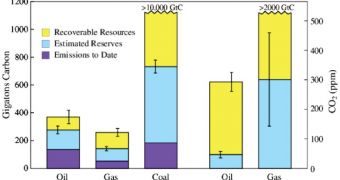An international collaboration of climate change researchers argues that global warming should be kept under 1 degree Celsius, instead of 2 degrees, as currently proposed. This limitation needs to be put into effect so that we can prevent negative effects of climate change from taking a hold on the planet.
Previous studies suggested that global warming needs to be kept under 2 degrees Celsius compared to pre-Industrial levels, but the new research suggests that this target may be too optimistic. The group argues that the maximum temperature increase we should allow is 1 degree Celsius from these levels.
This argument is supported by a new paper, entitled “Assessing ‘Dangerous Climate Change’: Required Reduction of Carbon Emissions to Protect Young People, Future Generations and Nature,” which is published in the December 3 issue of the open-access scientific journal PLoS ONE.
The research group, which includes top economists and climatologists, as well as former NASA scientist James Hansen, also used this study to provide a series of solutions for authorities and governments worldwide, in their fight against global warming.
A brief analysis of the progresses made over the past few years in this area indicates that governments are not even on track to preventing global temperatures from rising by 2 degrees Celsius, let alone 1. Renewable energies, combined with more expensive carbon emission permits, and cheaper nuclear power could help address this issue.
“Rapid emissions reduction is required to restore Earth’s energy balance and avoid ocean heat uptake that would practically guarantee irreversible effects. Continuation of high fossil fuel emissions, given current knowledge of the consequences, would be an act of extraordinary witting intergenerational injustice,” the team writes in the new paper.
The international scientific community agrees that a 2-degree increase in global temperatures will lead to catastrophic sea level rises, of up to 6 meters (20 feet) from current levels. The incidence of negative atmospheric events, such as tropical storms and violent hurricanes, will also increase.
At the same time, biodiversity both on land and in the sea will decrease. Acidification will drastically reduce the number of species living in the water, while desertification will forever change ecosystems on land. Evidence to support this bleak prediction can be found by analyzing the Eemian Period (130,000 to 114,000 years ago), when global temperatures increased by 2 degrees Celsius.
“More generally, humanity and nature, the modern world as we know it, is adapted to the Holocene climate that has existed more than 10,000 years. Warming of 1 degree Celsius relative to 1880–1920 keeps global temperature close to the Holocene range,” the team explains.
“Mega-heatwaves, such as those in Europe in 2003, the Moscow area in 2010, Texas and Oklahoma in 2011, Greenland in 2012, and Australia in 2013 have become more widespread with the increase demonstrably linked to global warming,” they conclude.

 14 DAY TRIAL //
14 DAY TRIAL //